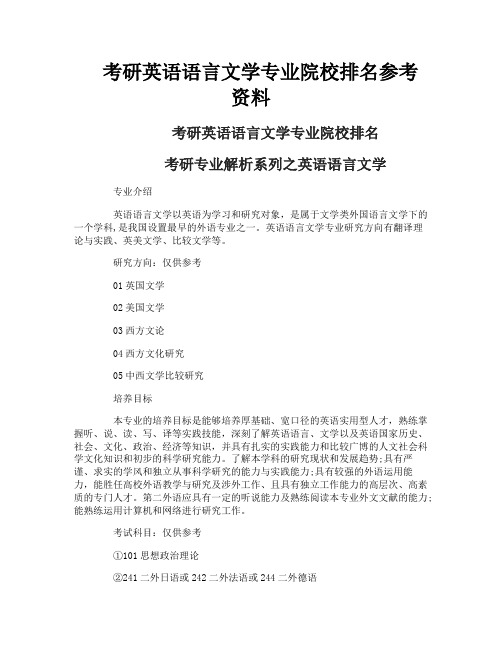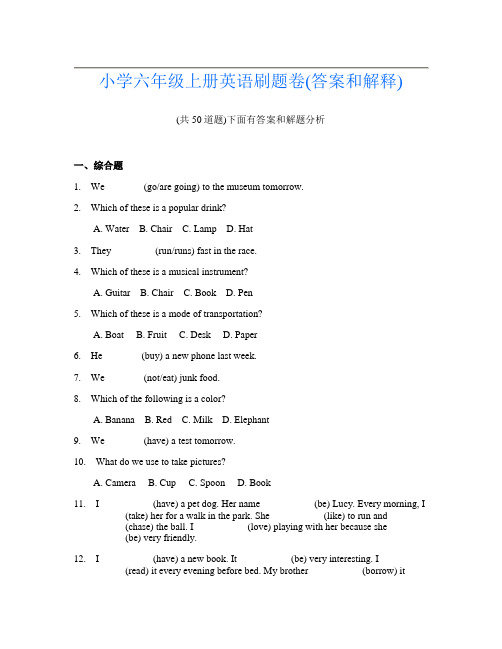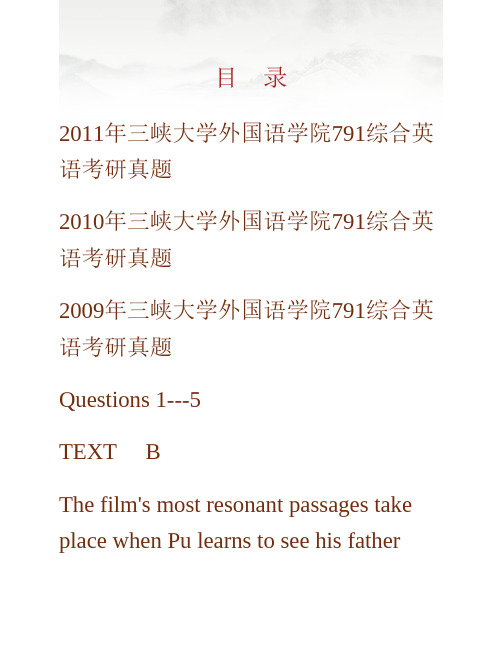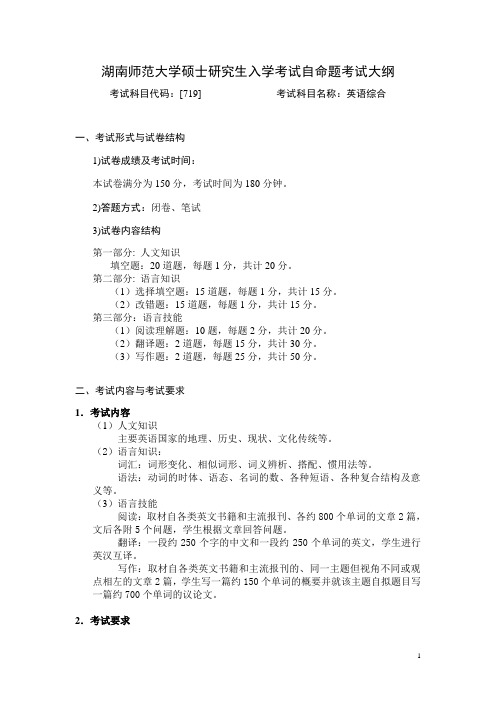719 英语综合
北师版英语选修7Unit19单元综合测评1.docx

单元综合测评(一)I .阅读理解(共15小题;每小题2分;满分30分)AA Hong Kong Disneyland park admission ticket is your passport to a full day of magical adventures. Learn the ways to buy your tickets now.Three types of 1-Day ticket are available.Ticket Type PriceGeneral Admission Ticket (aged 12〜64) HK D|S499Child Ticket (aged 3〜11) HK D|S355Senior Ticket (aged 65 or above) HK D|S100Free admission for Child aged under 3.♦Book Online NowPurchase tickets conveniently through our website, then pick up your tickets starting from 1 hour after you have purchased online.♦Purchase Tickets Directly at Hong Kong Disneyland Ticket ExpressYou can purchase tickets at the Hong Kong Disneyland Ticket Express, conveniently located at the MTR Hong Kong Station. Open from 9: 00 am〜8: 00 pm on Mondays to Fridays and from 9: 00 am〜5: 00 pm on Saturdays, Sundays and Public Holidays.♦Purchase 2 Park Tickets at one of the following locations and receive a FREE limited-edition Disney gift:•Avenue of Stars KiosksYou can purchase tickets at Avenue of Stars Kiosks in Tsim Sha Tsui. Open daily from 9: 00 am〜10: 30 pm.•Asia World-Expo Box OfficeYou can purchase tickets at Asia World-Expo Box Office.Open Mondays to Fridays from 10: 00 am〜6: 00 pm.♦Reserve Tickets for Hotel GuestAs a hotel Guest of Hong Kong Disneyland Hotel or Disney's Hollywood Hotel, Park tickets are reserved for your purchase at front desk. Open daily from 9: 00 am^8: 00 pm.♦Buy at Hong Kong Disneyland Main EntranceGuests can purchase tickets on the day of their visit at the Main Entrance Tickey Booths or Guest Relations Windows.Open daily from 30 minutes before Park opening until Park closes.【语篇解读】本文是一则香港迪士尼乐园的广告,重点介绍了购买香港迪士尼乐园门票的方法。
23杭州师范大学全日制学硕招生简章

1201管理科 学与工程
120100管理科学与工程
02电子商务技术
03服务科学与管理
①101思想政治理论
003阿里巴巴商 学院
17
②201英语(一) ③303数学(三)
④814管理科学基础
01公共政策分析
120401行政管理
9
卫生综合
护理学专业综合 程序设计实践 电子商务基础 行政管理学
120401行政管理 120404社会保障
④无
中国古代史研究 中国近现代史研究 中国史研究 历史文献学
010数学学院
①101思想政治理论
28
②201英语(一) ③722数学分析
④824高等代数
综合数学
011物理学院
①101思想政治理论
22
②201英语(一) ③723量子力学
④825普通物理学
四大力学
①101思想政治理论
012材料与化工 学院
④无 3
04营养与衰老研究
01遗传毒理学
02分子毒理学
100405卫生毒理学
1
03环境毒理学
04系统毒理学
1011护理学 101100护理学
01护理教育
02社区护理 03老年护理
018护理学院
04临床护理(助产、急危重症、疼 痛等)
①101思想政治理论
11
②201英语(一) ③308护理综合
④无
01信息管理与信息系统
③720外国文学
④822写作(一)
①101思想政治理论
②240二外日语或241二外德语
4
或242二外法语或201英语 (一)或202俄语
文化话语研究
③721话语传播研究
考研英语语言文学专业院校排名参考资料

考研英语语言文学专业院校排名参考资料考研英语语言文学专业院校排名考研专业解析系列之英语语言文学专业介绍英语语言文学以英语为学习和研究对象,是属于文学类外国语言文学下的一个学科,是我国设置最早的外语专业之一。
英语语言文学专业研究方向有翻译理论与实践、英美文学、比较文学等。
研究方向:仅供参考01英国文学02美国文学03西方文论04西方文化研究05中西文学比较研究培养目标本专业的培养目标是能够培养厚基础、宽口径的英语实用型人才,熟练掌握听、说、读、写、译等实践技能,深刻了解英语语言、文学以及英语国家历史、社会、文化、政治、经济等知识,并具有扎实的实践能力和比较广博的人文社会科学文化知识和初步的科学研究能力。
了解本学科的研究现状和发展趋势;具有严谨、求实的学风和独立从事科学研究的能力与实践能力;具有较强的外语运用能力,能胜任高校外语教学与研究及涉外工作、且具有独立工作能力的高层次、高素质的专门人才。
第二外语应具有一定的听说能力及熟练阅读本专业外文文献的能力;能熟练运用计算机和网络进行研究工作。
考试科目:仅供参考①101思想政治理论②241二外日语或242二外法语或244二外德语③719基础英语④824英美文学重点学科单位英语语言文学二级国家重点学科:北京大学、北京外国语大学、上海外国语大学、南京大学、湖南师范大学、中山大学、解放军外国语学院院校排名第一档次:北京外国语大学、上海外国语大学、北京大学、南京大学第二档次:湖南师范大学、中山大学、复旦大学、山东大学、厦门大学、华东师范大学、北京师范大学、西南大学、清华大学第三档次:南京师范大学、华中师范大学、浙江大学、东北师范大学、广东外语外贸大学、苏州大学、四川大学、河南大学、福建师范大学、南开大学、四川外语学院、大连外国语学院第四档次:西安外国语大学、中南大学、北京语言大学、上海大学、华中科技大学、天津外国语大学、黑龙江大学、上海交通大学、北京第二外国语学院、陕西师范大学、西北师范大学、湘潭大学、东南大学、华南师范大学、湖南大学、安徽大学、吉林大学、安徽师范大学、上海海事大学、郑州大学、辽宁大学、上海师范大学、中国人民大学、广西师范大学、山东师范大学、江西师范大学、四川师范大学、上海对外贸易学院、西北大学、武汉大学、河北师范大学、首都师范大学、暨南大学、辽宁师范大学、山西大学、河北大学、广西大学、深圳大学等。
小学六年级上册英语刷题卷(答案和解释)719

小学六年级上册英语刷题卷(答案和解释)(共50道题)下面有答案和解题分析一、综合题1.We _______ (go/are going) to the museum tomorrow.2.Which of these is a popular drink?A. WaterB. ChairC. LampD. Hat3.They ________ (run/runs) fast in the race.4.Which of these is a musical instrument?A. GuitarB. ChairC. BookD. Pen5.Which of these is a mode of transportation?A. BoatB. FruitC. DeskD. Paper6.He _______ (buy) a new phone last week.7.We _______ (not/eat) junk food.8.Which of the following is a color?A. BananaB. RedC. MilkD. Elephant9.We _______ (have) a test tomorrow.10.What do we use to take pictures?A. CameraB. CupC. SpoonD. Book11.I __________ (have) a pet dog. Her name __________ (be) Lucy. Every morning, I __________ (take) her for a walk in the park. She __________ (like) to run and__________ (chase) the ball. I __________ (love) playing with her because she__________ (be) very friendly.12.I __________ (have) a new book. It __________ (be) very interesting. I__________ (read) it every evening before bed. My brother __________ (borrow) ityesterday, but he __________ (forget) to return it. I __________ (ask) him to bring it back today.13.Every morning, I __________ (wake) up at 7:00 AM. Then, I __________ (brush) my teeth and __________ (eat) breakfast. After breakfast, I __________ (go) to schoolby bus. I __________ (arrive) at school at 8:00 AM. My favorite subject __________ (be) math, and I __________ (enjoy) learning it.14.Which of these animals lives in water?A. DogB. FishC. ElephantD. Lion15.I _______ (like/likes) reading books.16.He _______ (eat) breakfast at 7:00 every day.17.He _______ (be) a doctor.18.Which one is a fruit?A. PotatoB. BananaC. OnionD. Lettuce19.My mother __________ (cook) dinner every evening. She __________ (make) delicious dishes, and I __________ (help) her in the kitchen. Last night, she __________ (prepare) spaghetti, and I __________ (set) the table. After dinner, we __________ (watch) a movie together. It __________ (be) a nice evening.20.He _______ (dance/dances) very well.21.He _______ (study) English every day.22.What is the opposite of "fast"?A. SlowB. QuietC. LoudD. Happy23.Which one is a mode of transportation?A. CarB. PlateC. SpoonD. Chair24.We _______ (be) at the park yesterday.25.Which one is used to write?A. PenB. SpoonC. PlateD. Fork26.I usually wake up at 7:00 a.m. After waking up, I brush my teeth and wash my face. Then, I have breakfast with my family. After breakfast, I put on my uniform and pack my schoolbag. I leave home at 8:00 a.m. and walk to school.27.I have a pet __________. It is __________ and likes to __________. I take care of it every day. I feed it __________ and give it fresh __________. My pet also loves to play with its __________. Sometimes, we go to the __________ to play together. After playing, I give my __________ a bath to keep it __________. I love my pet very much because it is __________ and makes me happy.28.What is the color of the sky on a clear day?A. GreenB. BlueC. RedD. Yellow29.I _______ (write) a report for school now.30.What do you drink milk from?A. ForkB. KnifeC. CupD. Spoon31.He _______ (take/takes) the bus to school every day.32.Which sentence has the correct plural form?A. I have three cats.B. I have three cat.C. I have three catses.D. I have three cates.33.They _______ (not) go to the swimming pool on Mondays.34.I _______ (play) football every weekend.35.My brother _______ (watch) TV right now.36.They _______ (do) their homework after school.37.Yesterday, I __________ (1) my homework in the afternoon. After I __________ (2) it, I __________ (3) to the park with my sister. We __________ (4) the swings and__________ (5) a lot of fun. Later, we __________ (6) ice cream before going home.38.Which of these is used for drinking?A. CupB. SpoonC. PlateD. Knife39.Which animal lives in water?A. DogB. FishC. CatD. Bird40.Which of these is a sweet food?A. CakeB. CarrotC. PotatoD. Onion41.He _______ (play) basketball now.42.Which one is used to clean?A. BroomB. PlateC. ChairD. Knife43.I _______ my friends at school every day.44.Which one is a color?A. RedB. SpoonC. PlateD. Chair45.Which of the following is the correct translation of “我喜欢苹果”?A. I like bananas.B. I like apples.C. I like oranges.D. I like grapes.46.He _______ (bring) his lunch to school every day.47.Which one is a tool?A. HammerB. PlateC. ChairD. Spoon48.We _______ (have/has) a big garden.49.What do we use to play music?A. PianoB. PenC. CupD. Shoe50.When you are in a classroom, and the teacher is explaining a lesson, it’s important to listen carefully and take notes. However, sometimes you might miss something important. In this situation, what should you do to e nsure you don’t miss out on key information during the lesson?A. Raise your hand and ask the teacher to repeatB. Talk to your friend during the lessonC. Ignore the teacher and focus on your notesD. Leave the classroom(答案及解释)。
内蒙古考研参考书目.

考试科目名称 二外日语 二外德语 二外法语 二外英语 护理综合 教育综合 体育综合 中国哲学史 法理学 马克思主义哲学原理 教育技术学专业基础 体育学专业基础综合
716
语言文学综合基础
717 718 719
中国文化概论 综合英语(一) 综合日语
722 723
数学分析 量子力学 地理信息系统
724 725 726 727 728 729 730 731
有机化学(一) 高分子化学 细胞生物学 生态学 管理学 艺术基础理论 舞蹈史 中西音乐史
732
戏剧影视史论
733
中外美术史
734
参考书目 《中日交流标准日本语》(新版)(初级上\下册)(2005年第一版) 《新编大学德语》(第1-2册)(2002年9月第一版),朱建华主编 《新大学法语》(2003年6月版)(第1-2册),李志清主编 《新大学法语》(2004年4月版)(第3册),李志清主编 《全新版大学英语》(2001年,第1-4册),李荫华主编 《全新版大学英语解析》(2006年,第1-4册) 《内科护理学》(第四版),尤黎明主编 《外科护理学》(第四版),曹伟新主编 《新编护理学基础》(2006年),姜安丽主编 按照国家教指委下发考试大纲命题 按照国家教指委下发考试大纲命题 《中国哲学史》北京大学中国哲学史教研室编 《法理学》(第三版), 张文显主编 《辩证唯物主义和历史唯物主义原理》(2005年第五版),李秀林编 《教育技术学导论》(2006年版),黄荣怀编 《计算机网络》(2011版),吴功宜编 《体育学概论》(2005版),杨文轩 杨霆 《运动生理学》(2011年第二版),王步标、华明主编 《中国现代文学三十年》(修订本),钱理群编(限中国现当代文学专业) 《文学理论教程》,童庆炳主编(限文艺学专业) 《中国文学史》,袁行霈主编(限中国古代文学、中国古典文献学专业) 《语言学纲要》,叶蜚声、徐通锵主编(限汉语言文字学、语言学及应用语言学专业) 《古代汉语》(校订重排本),王力主编(限汉语言文字学、语言学及应用语言学专业) 《现代汉语》(重订本),胡裕树主编(限汉语言文字学、语言学及应用语言学专业) 《外国文学史》(2006年版),郑克鲁主编(限比较文学和世界文学专业) 《中国文化概论》(2007年版),金元浦主编 英语专业八级水平综合能力测试,参考书任选 日语专业八级水平综合能力测试,参考书任选 《城市学概论》(2008年版),牛凤瑞主编 《公共政策学》(2011年版),宁骚主编 《中国城市发展史》(2009年版),傅崇兰、白晨曦、曹文明 《全球城市史》(2010年版),科特金主编 《数学分析》(2007年,第三版),欧阳光中等编 《量子力学教程》,周世勋著 《地理信息教程》(2007版),汤国安著
三峡大学791综合英语09-19年真题

目 录2011年三峡大学外国语学院791综合英语考研真题2010年三峡大学外国语学院791综合英语考研真题2009年三峡大学外国语学院791综合英语考研真题Questions 1---5TEXT BThe film's most resonant passages take place when Pu learns to see his fatherwith new clarity Questions 6---10 Questions 11---15 TEXT D Questions 16---202011年三峡大学外国语学院791综合英语考研真题2010年三峡大学外国语学院791综合英语考研真题2009年三峡大学外国语学院791综合英语考研真题Questions 1---5TEXT BThe film's most resonant passages take place when Pu learns to see his father with new clarityQuestions 6---10 Questions 11---15 TEXT DQuestions 16---2016. The author did not know exactly when he was born because A. he did not know who his mother was. B. there was no written evidence of it. C. his master did not tell his father. D. nobody on his farm knew anything about it.17. In the mid-nineteenth century, slaves often A. marked their birthdays by the season. B. did not really care how old they were. C. forgot the exact time when they were born. D. pretended not to know each other's birthdays. 18. The author's mother told him A. his father was black. B. his father was white.C. nothing about his father.D. his master was his father. 19. According to the passage, when the author was very young his motherA. ran away.B. was light-skinned.C. had several children.D. was sent to work elsewhere. 20. The author was most probably raised A. by his grandparents. B. by an old woman slave. C. with his master's support. D. together with other children. ⅳ. Translate the following two paragraphs into Chinese. (20分) 请按顺序把答案写在答题纸上。
大连大学2020年714基础英语

2020年全国硕士研究生入学考试《基础英语》考试大纲一、试卷满分及考试时间满分为150分,考试时间为180分钟。
二、答题方式答题方式为闭卷、笔试。
三、试卷题型结构试卷内容由六大题型组成,即词汇(20%)、语法(20%)、阅读理解(40%)、完形填空(10%)、改错(10%)和写作(50%)。
试题示例:I.词汇(20%)1.He ______ his head, wondering how to solve the problem.A. scrappedB. screwedC. scrapedD. scratched……II.语法(20%)2. I'm awfully sorry, but I had no alternative. I simply _____ what I didA. ought to have doneB. have to doC. had to doD. must do……III.阅读理解(40%)When Robert Krauss was a boy, 50 years ago, his grandfather told him a story about two men walking down a street one cold winter’s day. One man babbled incessantly, while his companion, frigid hands stuffed in his pockets, merely nodded here and there. Finally, the talker asked, “Shmuel, why aren’t you saying anything?” To which the friend replied, “I forgot my gloves.”As a boy , Krauss was hard put to understand how someone could be struck dumb by having his hands stilled . But now, as a professor of psychology at Columbia University, he has made the role of gestures in speech a focus of his research. When Krauss started, the conventional scientific wisdom was that gestures are a visual language that conveys meaning --- a pointed finger means “you,” a hand brushed sideways means “over there.” But since some gestures, such as chopping the air in rhythm with one’s sentences, are clearly meaningless, there is an emerging consensus that gestures serve another function, says Krauss: “The y help people retrieve elusive words from their memory .”A slew of recent and upcoming papers pinpoint how talking with your hands can unlock what Krauss calls “lexical memory.” One study, for instance, finds that speakers gesture more when they try to define words that have a strong spatial component ---- like “under” or “adjacent” --- than when defining words that are more abstract, like “thought” or “evil” And doctors notice thatstroke patients whose brain lesion impairs their ability to name objects gesture more, “as if they are trying everything they can to come up with a word,” says Krauss. Even people who don’t think they’re gesturing may be. Krauss attached electrodes to people’s arms to measure the activation of their muscles --- a little clench that doesn’t blossom into a full gesture. Then he asked them to come up with words that fit a definition he supplied. “You get more muscle activation when you try to access a word like ‘castanets”, which has a connotation of movement, than when you try to access an abstract word like ‘mercy’, he found.If gesticulating is like wielding a key to the door of lexical memory, then someone who can’t use his hands should have more trouble unlocking the door. That is just what a new study in the American Journal of Psychology finds. In the experiment, volunteers held onto a bar to keep their hands still; when Donna Frick-Horbury of Appalachian State University in North Carolina read them definitions (“an ancient instrument used for calculations”) the subjects more often failed to think of the word (“abacus”), or took longer to do it, than when they could gesture freely. “Many subjects would actually make motions of using an abacus before coming up with the word, ” says psychologist Robert Guttentag of the University of North Carolina at Greensboro, who oversaw the study.Such findings provide a clue to how our word memory works. Many doors in the brain seem to open onto memories. Just as a whiff of turmeric may unleash a recollection of Grandma’s kitchen, so gesturing may open a door to a word with a spatial or movement connotation, says neuroscientist Brian Butterworth of University College, London. This theory “makes sense,” says memory expert Daniel Schacter of Harvard University, “because we know that the more e laborately a memory is encoded ” --- with vision , smell and movement , for instance --- “the easier it is to access . ”Not everyone talks with his hands. At the extremes, some people gesture 40 times more than others, Krauss finds. An anthropology study in 1940s New York found that Italian and Jewish immigrants gestured a lot; Jews tended to keep their gestures small, while Italians were more expansive. Krauss suspects that the differences reflect the rhythmicity of languages: the more rhythmic, the mor e gestures. But something even more interesting may be going on “How much people gesture may reflect a difference in how they think,” says Krauss. “People who gesture a lot may conceptualize things in spatial terms. For instance, rather than thinking of ‘comprehension’ as a purely abstract concept, they may think of it as physically grasping something. And some people may conceive of ‘freedom’ not only as political, but also in more spatial terms”, such as “without boundaries,” which lends itself to gesture. The more an abstract word has physical counterparts, the more helpful gesturing would be. Next time you’re tongue-tied, then, try hand-waving .1. According to the passage, the field that professor Krauss focuses on is ____.A. biologyB. anthropologyC. psychologyD. medicine……IV.完形填空(10%)Public image refers to how a company is viewed by its customers, suppliers, and stockholders, by the financial community, by the communities 1 it operates, and by federal and local governments. Public image is controllable 2 considerable extent, just as the product, price, place, and promotional efforts are.A firm's public image plays a vital role in the 3 of the firm and its products to employees, customers, and to such outsiders 4 stockholders, suppliers, creditors, government officials, as well as 5 special groups. With some things it is impossible to 6 all the diverse publics: for example, a new highly automated plant may meet the approval of creditors and stockholders, 7 it will undoubtedly find 8 from employees who see their jobs 9 .On the other hand, high quality products and service standards should bring almost complete approval, 10 low quality products and 11claims would be widely looked down upon.A firm's public image, if it is good, should be treasured and protected. It is a valuable 12 that usually is built up over a long and satisfying relationship of a firm with publics. If a firm has earned a quality image, this is not easily 13 or imitated by competitors. Such an image may enable a firm to 14 higher prices, to win the best distributors and dealers, to attract the best employees, to expect the most 15 creditor relationships and lowest borrowing costs. It should also allow the firm's stock to command higher price-earnings 16 than other firms in the same industry with such a good reputation and public image.A number of factors affect the public image of a corporation. 17 include physical 18 contacts of outsiders 19 company employees, product quality and dependability, prices 20 to competitors, customer service, the kind of advertising and the media and programs used, and the use of public relations and publicity.(1)A. which B. what C. where D. whom(2)A. in B. within C. on D. to(3)A. attraction B. attachment C. affection D. generalization(4)A. and B. with C. as D. for(5)A. converse B. diverse C. reverse D. universe(6)A. satisfy B. treat C. amuse D. entertain(7)A. so B. then C. thus D. but(8)A. support B. identification C. compliment D. resistance(9)A. ensured B. promoted C. threatened D. unemployed(10)A. because B. while C. though D. when(11)A. false B. fake C. artificial D. counterfeit(12)A. fortune B. asset C. possession D. property(13)A. countered B. defeated C. repelled D. compelled(14)A. pay B. get C. order D. charge(15)A. favorite B. prosperous C. favorable D. prospective(16)A. rate B. ratio C. ration D. interest(17)A. These B. They C. That D. It(18)A. appliances B. equipment C. devices D. facilities(19)A. on B. with C. in D. along(20)A. relative B. related C. reliable D. reconcilableV.改错(10%)For over 900 years, the Tower of London has served as a loyal 1. ____ palace and fortress. Today, it’s famous for its bloody history andfor being the place where the Crown Jewels are kept. But it has servedfor other purposes, too. It has been the royal arsenal, royal mint, 2. ____royal observatory or even the royal zoo. The site of the Tower was 3.____originally part of the Roman city of Londinium.But in 1066 a foreigner from France became King William 4. ____of Britain, he ordered that a wooden castle built on the banks of 5.____the river Thames. The purpose of this fortress was to help secureLondon, the most important city in his view realm. Ten years later,William had the fortress rebuild in stone, and created a great 6. ____fortified palace with walls three meter thick. Today, this building 7.____is known as the White Tower, and it stands in the centre of a muchlarger stone fortress, which was built during later centuries. TheTower now covers the area of seven hectares, and it stands near the 8.____busy financial district of the capital. But, once inside the high stonewalls, it’s easy to forget the modern world outside and to take atrip back through history. To help visitors explore, there are specialceremonial guards, called Yeoman Warders. They are also known asBeefeaters, and they are the best resource of information about the 9.____Tower’s history. Nearly 40 Yeoman liv e and work in the Tower.They are former soldiers have earned the privilege of serving as 10.____Yeoman after long service.VI.写作(50% )A nation should require all of its students to study the same national curriculum until they enter college.Write an essay of about 600 words. You should supply an appropriate title for your essay.In the first part of your essay you should state clearly your main argument, and in the second part you should support your argument with appropriate details. In the last part you should bring what you have written to a natural conclusion or make a summary.四、适用学科外国语言学及应用语言学五、考核内容本考试重点是考查学生的有一定难度的读、写、译的能力。
719 英语综合

湖南师范大学硕士研究生入学考试自命题考试大纲考试科目代码:[719] 考试科目名称:英语综合一、考试形式与试卷结构1)试卷成绩及考试时间:本试卷满分为150分,考试时间为180分钟。
2)答题方式:闭卷、笔试3)试卷内容结构第一部分: 人文知识填空题:20道题,每题1分,共计20分。
第二部分: 语言知识(1)选择填空题:15道题,每题1分,共计15分。
(2)改错题:15道题,每题1分,共计15分。
第三部分:语言技能(1)阅读理解题:10题,每题2分,共计20分。
(2)翻译题:2道题,每题15分,共计30分。
(3)写作题:2道题,每题25分,共计50分。
二、考试内容与考试要求1.考试内容(1)人文知识主要英语国家的地理、历史、现状、文化传统等。
(2)语言知识:词汇:词形变化、相似词形、词义辨析、搭配、惯用法等。
语法:动词的时体、语态、名词的数、各种短语、各种复合结构及意义等。
(3)语言技能阅读:取材自各类英文书籍和主流报刊、各约800个单词的文章2篇,文后各附5个问题,学生根据文章回答问题。
翻译:一段约250个字的中文和一段约250个单词的英文,学生进行英汉互译。
写作:取材自各类英文书籍和主流报刊的、同一主题但视角不同或观点相左的文章2篇,学生写一篇约150个单词的概要并就该主题自拟题目写一篇约700个单词的议论文。
2.考试要求(1)能比较系统地掌握主要英语国家社会与文化基本知识;(2)能熟练掌握常用词汇和语法基础知识;(3)能准确理解阅读材料的主旨要义、具体信息、概念性含义,理解字面意义和隐含意义,进行有关的判断、推理和引申,根据上下文推测生词的词义,对所读材料的思想观点、语篇结构、语言特点和修辞手法等进行分析;(4)能够准确理解英、汉两种语言并进行翻译转换;(5)具有较强的英文写作能力,包括语言运用能力、逻辑思维能力、创新思维能力等。
三、参考书目1.何其莘、(美)童明编:《文化透视英语教程》(1)(2)(3)(4),外语教学与研究出版社,2007年。
- 1、下载文档前请自行甄别文档内容的完整性,平台不提供额外的编辑、内容补充、找答案等附加服务。
- 2、"仅部分预览"的文档,不可在线预览部分如存在完整性等问题,可反馈申请退款(可完整预览的文档不适用该条件!)。
- 3、如文档侵犯您的权益,请联系客服反馈,我们会尽快为您处理(人工客服工作时间:9:00-18:30)。
2014年硕士研究生入学考试自命题考试大纲
考试科目代码:719 考试科目名称:英语综合
一、考试形式与试卷结构
1.试卷分值及考试时长
本试卷满分为150分,考试时长为180分钟。
2.答题方式
答题方式为闭卷,笔试。
3.试卷结构
第一部分: 人文知识
填空题:20道题,每题1分,共计20分。
第二部分: 语言知识
(1)选择填空题:15道题,每题1分,共计15分。
(2)改错题:15道题,每题1分,共计15分。
第三部分:语言技能
(1)阅读理解题:10题,每题2分,共计20分。
(2)翻译题:2道题,每题15分,共计30分。
(3)写作题:2道题,每题25分,共计50分。
二、考试内容与考试要求
1.考试内容
(1)人文知识
主要英语国家的地理、历史、现状、文化传统等。
(2)语言知识:
词汇:词形变化、相似词形、词义辨析、搭配、惯用法等。
语法:动词的时体、语态、名词的数、各种短语、各种复合结构及意义等。
(3)语言技能
阅读:取材自各类英文书籍和主流报刊、各约800个单词的文章2篇,文后各附5个问题,学生根据文章回答问题。
翻译:一段约250个字的中文和一段约250个单词的英文,学生进行英汉互译。
写作:取材自各类英文书籍和主流报刊的、同一主题但视角不同或观点相左的文章2篇,学生写一篇约150个单词的概要并就该主题自拟题目写一篇约700个单词的议论文。
2.考试要求
(1)能比较系统地掌握主要英语国家社会与文化基本知识;
(2)能熟练掌握常用词汇和语法基础知识;
(3)能准确理解阅读材料的主旨要义、具体信息、概念性含义,理解字面意义和隐含意义,进行有关的判断、推理和引申,根据上下文推测生词的词义,对所读材料的思想观点、语篇结构、语言特点和修辞手法等进行分析;
(4)能够准确理解英、汉两种语言并进行翻译转换;
(5)具有较强的英文写作能力,包括语言运用能力、逻辑思维能力、创新思维能力等。
三、参考书目
1.何其莘、(美)童明编:《文化透视英语教程》(1)(2)(3)(4),外语教学与研究出版社,2007年。
2.张汉熙主编:《高级英语》(第1册)(第2册),外语教学与研究出版社,2010年。
3.王恩铭编:《英语国家概况》,上海外语教育出版社,2008年。
